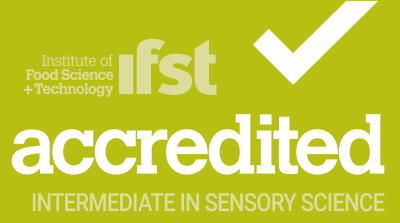Sensory evaluation workshop (IFST accredited – intermediate level)
Optional IFST Intermediate exam will take place from 1000 - 1100 hours on 17 June 2026 - this will be remotely delivered and invigilated.
Dates
10%
Prices
Members - £1975 + VAT
Non-members - £2400 + VAT
Includes exam fee
Venue
Campden BRI, Chipping Campden
Delegate feedback (2024&2025):
- I would highly recommend this course for anyone that is looking for a deeper understanding of sensory analysis or is trying to improve the practise of their current testing methodologies. The content has a great level of detail but is presented in a very clear manner with plenty of exercises that bring it to life and build your confidence to be able to run and analyse numerous testing methods to suit your company needs.
- Methods and statistics were explained very clearly and the practicals also helped me to understand what we had learnt.
- Practical exercises that put theory into reality. Use of break out activites were well thought out and executed, timed to make overall sessions more relevant. Great course and delivery by expert team.
- Very knowledgeable and good way of teaching to make information easy to understand.
- I feel highly upskilled! So much to take away from this course. Tutors were great and really an expert in the subject they were talking about. Really enjoyed the course!
- Tutors were superb, engaging, professional and accommodating.
- Brilliant tutors, really knowledgeable and practicals were really good.

Listen to a tutor talk about the course
Update your browser or Flash plugin
Benefits of attending
This course provides a thorough overview of sensory science, including the human senses and how they are used in sensory evaluation practices, sensory methodology, best practice when conducting these methods, panel recruitment, screening and training and thorough data analysis. Typical attendees usually include those new to sensory science or those who wish to develop and improve their existing skills. They will gain an understanding of the importance of objective sensory evaluation activities in the food and drink industry but most importantly how the data is collated and analysed using advanced statistical techniques
Training Course content
- Day 1 - an introduction to sensory evaluation - the senses, and sensory methods and panels
- Day 2 - data collection, sensory statistics and discrimination test methods
- Day 3 - further sensory statistics with practical activities on univariate and multivariate data analysis and descriptive profiling methods
- Day 4 - panel performance and motivation, product quality and consumer research.
Course aims
- To provide a thorough overview of sensory science
- To gain an understanding of the recruitment, screening and training process when using different types of sensory assessors
- To show the differences in sensory methods using several practical activities
- To examine different types of data related to different methods and provide ways to statically analyse them using univariate (ANOVA and multiple comparison tests) and multivariate (PCA and GPA) statistics to allow delegates to participate as an assessor in a Quantitative Descriptive Analysis project
Learning Outcomes
At the end of the course you will be able to:-
- Recruit, screen and train a sensory panel for different purposes
- Explain why best practice is important
- Demonstrate the differences in sensory methodology and its uses
- Calculate and explain the output of univariate statistical results using practical exercisesInterpret and review the PCA and GPA graphs obtained from panel performance data by practical activity participation
- Have the opportunity to demonstrate competency and awareness by taking the intermediate exam
Optional IFST Intermediate Exam - will take place from 1100 - 1200 hours on 17 June 2026 - this will be remotely delivered and invigilated (exam is included in the course fee).
Further information
Our training team will be happy to help with any enquiry on +44(0)1386 842104 or at training@campdenbri.co.uk

